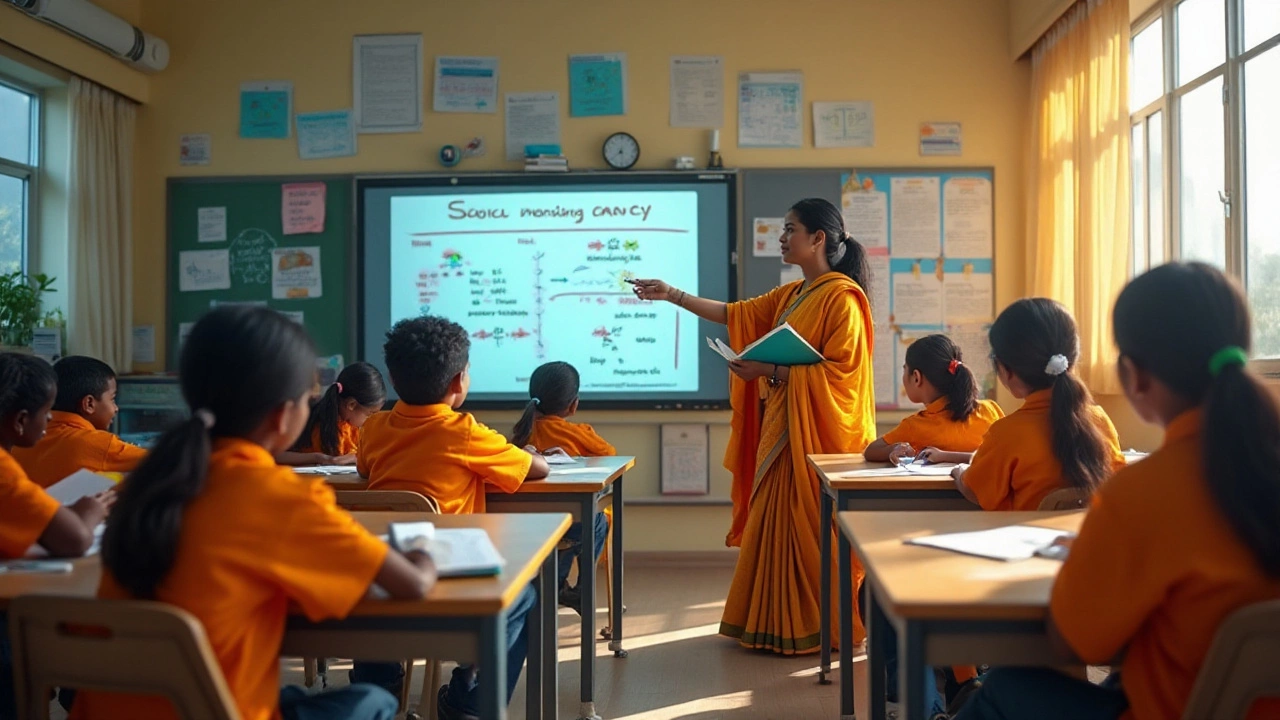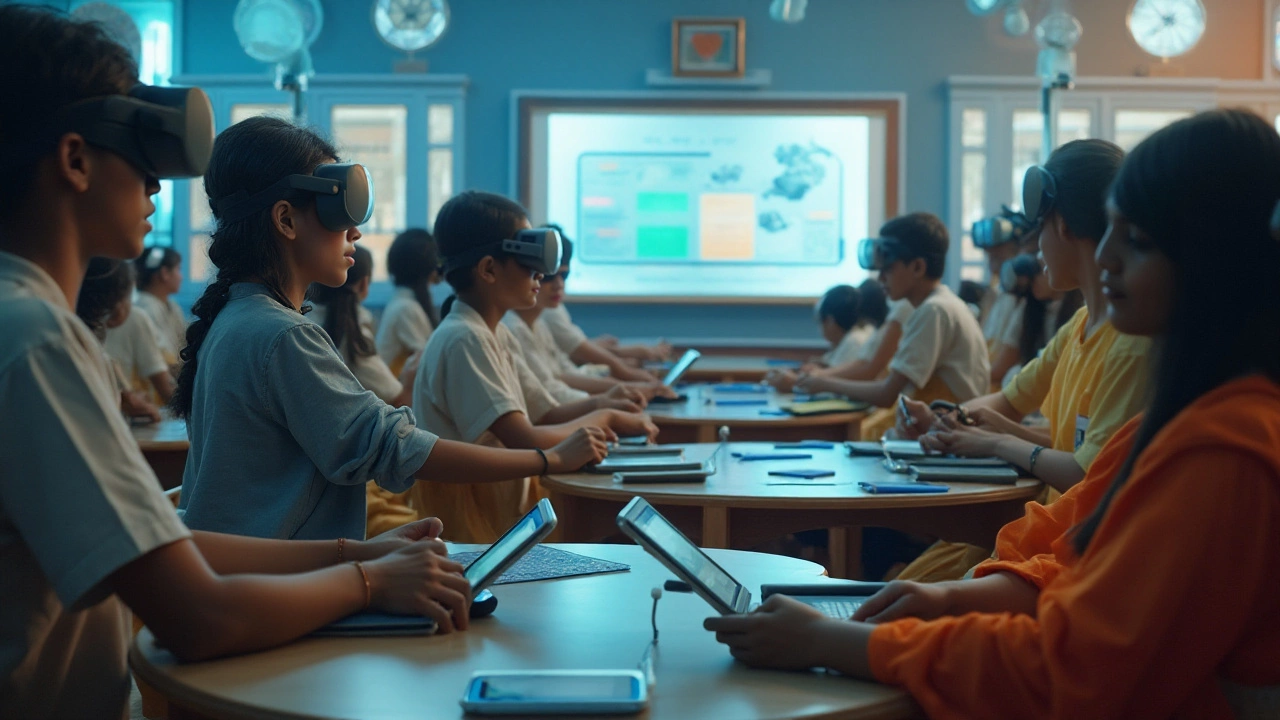CBSE: A Preferred Choice for Holistic Education in India
 Jan, 25 2025
Jan, 25 2025
The Central Board of Secondary Education, commonly known as CBSE, is a prominent educational board in India, with its roots deeply connected to the enhancement of the academic framework in the country. Many families opt for CBSE because it promises a balanced blend of theoretical knowledge and practical understanding, making it a coveted choice across different states.
CBSE’s curriculum is designed to nurture students' intellectual curiosity while equipping them with the required skill set to face competitive exams with confidence. Its focus on a comprehensive approach to education ensures that children are not merely book-smart but are also capable of critical thinking and problem-solving in real-world scenarios. Through this article, we will delve into the distinctive aspects that make CBSE a compelling choice for anyone aiming to craft a bright educational path for their children.
- Unique Features of the CBSE Syllabus
- Adaptability to Modern Education Needs
- Benefits for Students and Parents
- Leveraging the CBSE Framework
Unique Features of the CBSE Syllabus
The CBSE syllabus is renowned for maintaining a structured approach that rationally progresses from fundamental concepts to more complex ones as students advance through the years. This organized framework underpins CBSE's reputation for reliability, catering effectively to varying states across India. A significant feature is its national relevance, ensuring that students are equipped to meet the intricacies of standardized tests like the IIT-JEE and NEET, which are gateways to prestigious higher education institutions in India.
This curriculum emphasizes better analytical understanding rather than rote memorization. By integrating various pedagogical techniques and continuous assessments, it promotes an interactive learning environment that's not just confined to the classroom. For students, textbooks are not merely a source of knowledge but a tool for fostering critical thinking, as they are meticulously designed by the National Council of Educational Research and Training (NCERT). Did you know NCERT textbooks have become a cornerstone for many competitive exams throughout India? A testament to its efficacy and standardization.
Dr. R. K. Khandelwal, a notable educationist, once remarked, "The CBSE curriculum embeds life-skills education, which is pivotal in forming a well-rounded personality." This highlights the board's balanced focus on academic learning and personal development.
The CBSE board stands out with its inclusion of innovative teaching methodologies that encourage exploration and inquiry. The syllabus is meticulously updated to incorporate modern advancements and global trends, preparing students for international educational benchmarks. Take the CCE (Continuous and Comprehensive Evaluation) system, for example, which ensures periodic assessments and holistic appraisals of students. This shift from an exam-centric approach to a broader assessment metric illustrates CBSE's dynamic nature in addressing diverse learning capabilities and student potential.
Highlights of the CBSE Examination Structure
In addition to its syllabus, CBSE's examination structure is worth noting for its effectiveness and clarity. The board conducts examinations with an approach that's both student-friendly and efficient. This includes a careful balance of objective and subjective questions, which helps gauge a student's comprehensive understanding of the subject matter. The grading system is devised to be transparent and inclusive, offering students multiple opportunities to improve their scores via supplementary exams.CBSE's adaptability to current educational needs and global standards translates into a seamless transition for students planning to pursue their education abroad. Its certification is widely accepted across international institutions, making it a preferred choice not only by Indian students but also by those from across borders. The CBSE board's commitment to sustainable education practices, combined with its robust curriculum, continues to resonate with students, educators, and parents who place a premium on quality education.
| Year | Student Enrollment |
|---|---|
| 2021 | 12 million |
| 2022 | 12.5 million |
| 2023 | 13 million |
Given these distinctive features, it's not surprising that the CBSE syllabus remains a key player in shaping the education landscape throughout India. It sets a foundation that nurtures creativity, encourages knowledge application, and prepares students to face evolving global challenges with a strong educational backing.

Adaptability to Modern Education Needs
The Central Board of Secondary Education (CBSE) continuously demonstrates its proficiency in adapting to the evolving demands of modern education. This adaptability stems from its dynamic curriculum, which is designed to incorporate technological advancements and contemporary pedagogical trends. By integrating digital learning tools into classrooms, CBSE equips students with essential skills that align with the technology-driven world. Schools under this board often engage in partnerships with tech companies and educational platforms to bring cutting-edge resources into the learning environment.
Another key aspect of CBSE's adaptability is its emphasis on life skills and emotional intelligence. Recognizing the importance of well-rounded personal development, CBSE encourages activities that nurture these skills alongside academic pursuits. This forward-thinking approach ensures that students are not only prepared for academic success but are also ready to face real-world challenges with resilience and empathy. Moreover, the board regularly updates its syllabus to reflect current global issues, like environmental sustainability and digital citizenship, keeping students informed and socially responsible.
One of the significant strides CBSE has made is in vocational education. Offering a plethora of vocational courses, CBSE provides students with the opportunity to explore practical career paths and gain hands-on experience. This aligns with the needs of a rapidly changing job market that values specialized skills and applied knowledge. By doing so, CBSE not only makes education more relevant and engaging but also provides students with a distinctive edge as they pursue further education or enter the workforce. This adaptability signifies the board's commitment to foster innovation within the traditional education framework.
"Education is the most powerful weapon which you can use to change the world." - Nelson Mandela
By crafting a curriculum that is both flexible and future-ready, CBSE stands out as a forerunner among educational boards in India. This ability to pivot according to societal needs and technological advancements speaks volumes about the board's dedication to providing a top-notch education. Such adaptability allows students to gain comprehensive knowledge while also preparing them for uncharted territories of the world beyond school. This progressive approach positions CBSE as a preferred choice among students and parents who seek a holistic educational experience.

Benefits for Students and Parents
Choosing the CBSE syllabus presents various advantages for both students and their parents. To start off, it lays a solid academic foundation that is aligned with national educational standards. This ensures a uniformity of education, giving students transferring from one state to another a relatively smooth transition. The CBSE board's consistency in maintaining a well-structured curriculum aids in reducing academic disruptions due to geographical relocations. Moreover, CBSE is highly instrumental when it comes to preparing students for competitive exams, especially those like IIT-JEE and NEET, as its syllabus comprehensively covers topics included in these examinations. This thorough preparation reduces the need for additional external coaching, often saving time and resources for families.
Parents often favor the Indian education system under CBSE as it promotes the holistic development of their children. The syllabus integrates co-scholastic subjects, including arts, health, and physical education, alongside academics. This approach helps students develop in fields beyond conventional subjects, nurturing their skills in diverse arenas. Moreover, CBSE encourages experiential learning and critical thinking through group work and project-based assessments. By doing this, students not only gain knowledge but learn practical application, fostering a broader understanding of topics.
The CBSE board is notable for incorporating updates and contemporary skills such as IT and coding into its curriculum, keeping students at the forefront of today's technological advancement. This constant adaptation makes students from CBSE-certified schools more adaptable and equipped with necessary life skills in the ever-evolving job market. Quoting Dr. Raju Sharma, an acclaimed educator,
"CBSE’s curriculum is a roadmap for students, steering them toward lifelong learning and adaptability to the changing demands of higher education and professional landscapes."For parents, this translates into an assurance that their child is receiving an education that evolves with time and remains relevant to modern-day challenges.
CBSE's focus on communicative language teaching is another benefit that cannot be overlooked. This method emphasizes communication skills over rote learning of grammar rules, helping students enhance their English proficiency, a crucial skill in our globally interconnected world. Moreover, the board recognizes the importance of emotional intelligence, embedding activities that promote self-awareness, empathy, and collaboration. This attention to emotional growth is vital, making students well-rounded individuals and easing parental concerns about their child's social development. The board's streamlined syllabus also means students have more time to pursue hobbies and activities beyond academics, allowing parents to nurture their child's innate talents and interests effectively.

Leveraging the CBSE Framework
When it comes to maximizing the educational potential of the CBSE syllabus, understanding its flexibility and resources is key. The board’s structure often mirrors real-world dynamics, prepping students not just for exams, but for life itself. With schools commonly hosting seminars, workshops, and interactive sessions, students can engage in the kind of experiential learning that goes beyond textbooks. This hands-on approach can be significantly beneficial, especially in subjects like science, where practical experiments enhance theoretical knowledge. It's such interactions that often lead young minds to explore various career paths with a deeper understanding of their own interests and aptitudes.
The beauty of the CBSE framework lies in its ability to adapt and integrate modern education trends. Recently, there's been a noticeable push towards incorporating descriptive and analytical skills in the curriculum. This is evidenced by the inclusion of competency-based questions in exams, encouraging students to think outside the box and apply their learning to hypothetical scenarios. These changes not only prepare students for competitive exams like the JEE or NEET but also instill a lasting competence in critical thinking and problem-solving.
According to a report by the National Institution for Transforming India, "CBSE's curriculum aims to create a sustainable foundation of education that caters not just to immediate academic needs, but holistic development."Parents and educators are gradually acknowledging that this kind of growth is crucial for future success, irrespective of the career path chosen by the students. This is why having a strategic approach in leveraging this Indian education system is essential.
To truly leverage the capabilities of the CBSE board, parents and students should focus on aligning the curriculum with the child's personal interests and strengths. Participating in elective subjects or co-curricular activities that the board offers can foster talent in areas that traditional schooling might overlook. Tutoring parents to navigate this system is equally important as doing counseling sessions with students to understand their aspirations and challenges.
Moreover, CBSE's communication channels with students and parents through digital platforms have improved access to study materials and real-time updates. Many schools are now equipped with smart classrooms and e-learning tools, setting the stage for a new kind of learning that combines the best of traditional teaching methods and cutting-edge technology. This modernization project has provided teachers with opportunities to enhance their teaching methods, making classes more interactive and engaging, thus enabling students to learn at their own pace.
While all of these factors may sound ambitious, recognized success stories from alumni back its efficacy. The CBSE board encourages schools to form clubs and societies that reflect real-world issues, such as environmental concerns or digital literacy. Through structured activities, students hone leadership, teamwork, and project management skills—qualities highly valued in today’s employment markets. It's in this co-curricular world that many students develop exceptional abilities that go on to define their careers.
Statistics reinforce these developments well. In a survey conducted by the HRD Ministry, over 85% of students reported feeling more confident in their problem-solving skills post their education from the board. They cited the integrated curriculum that frequently encourages curiosity-driven learning as a significant contributor. Given these impressive outcomes, it’s paramount for families to engage actively with the system and utilize its resources to the fullest extent. This way, children are better thrust prepared both for academic challenges and the innumerable tests that life invariably continues to present.